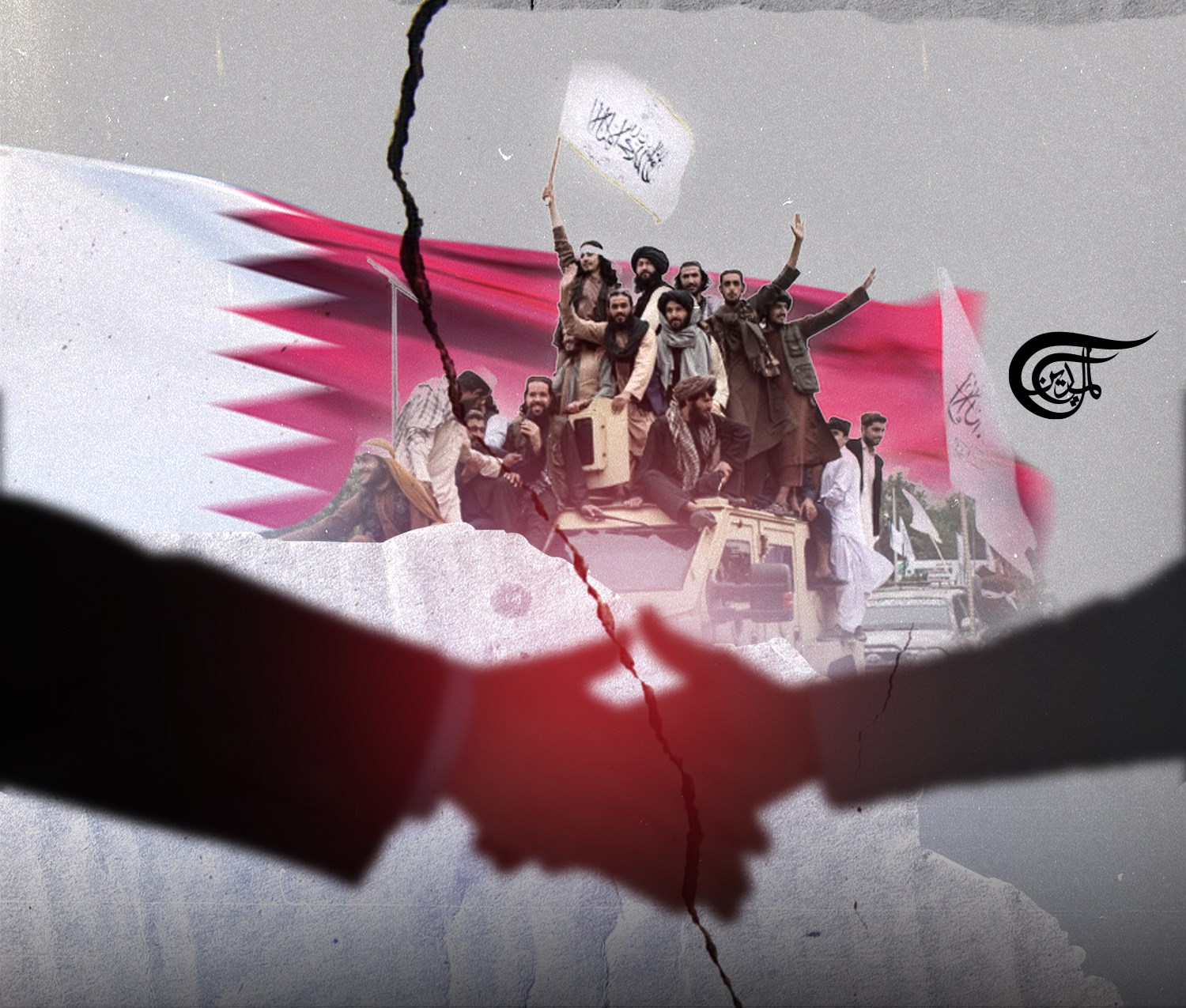The Qatar-Taleban Delusion
Today's stark and brutal reality in Afghanistan has delivered a sobering blow to Doha: those who deal with the Taleban, will only end up losing face.
-

The Qatar-Taleban Delusion
The Qatar government made it clear that as soon as it "felt" that its cooperation with the Taleban would not be in the interest of the people of Afghanistan, it would stop mediating.
It seems it has only now dawned on the Qataris just with whom they've been dealing over the past years. Because they are now tasting humiliation... At least that's how they are currently expressing their "feelings". But how did it come to this? How was it even possible for Qatar, which had not recognised the first Taleban government back in 1996, to suddenly knuckle under and agree to get involved with the Taleban? And how did Qatar now arrive at this (belated) sentiment?
Back in 2010, the US had begun looking for an expedient way to engage with the Taleban. At that time, a US soldier named Beaudry Bergdahl was taken prisoner by the Taleban, and the Taleban were hoping to exchange him for some of their prisoners in Guantanamo. That's when Mullah Akhtar Mohammad Mansour, a deputy commander of the Taleban, offered to hold talks.
According to some sources, there were three meetings involving him and representatives from Afghanistan and NATO. He is even said to have met up with Karzai personally at his palace in Kabul, but Karzai later denied this. As soon as the Afghan and US intelligence services paid Mullah Akhtar Mohammad Mansour several hundred thousand dollars, he disappeared... never to be seen again. It turned out that he impersonated Mullah Akhtar Mohammad Mansour and was not even a member of the Taleban. He is said to have been a simple (but clever) shopkeeper from the Pakistani city of Quetta ... or, according to others, an operative of the Pakistani intelligence agency, the ISI. While Karzai and his NATO uncles were hiding from journalists to avoid embarrassing questions about this fiasco, the Taleban and certainly the officials in the ISI were splitting their sides laughing.
"The Americans and their allies are totally obtuse and can be fooled by anyone", a Taleban spokesman said at the time.
But it was this particular humiliating blunder that sparked the beginning of Qatar's career as a mediator between the US and the Taleban. For the US, the states of Pakistan, Saudi Arabia and UAE were out of the question as mediators – for a lack of confidence in them, amongst several other reasons. Thus Qatar entered the picture as an option.
Qatar had not recognised the first Taleban regime (1996-2001) and had proven over the years to be a reliable and willing partner of the USA. Moreover, Qatar had already earned a good reputation in mediation in Sudan, Yemen and Lebanon in the 90s. By dealing with the Taleban this time, Qatar would be able to make a good impression on the US and curry its favour. And the Taleban, who always dreamed of having a representative department abroad, were also inclined to have it in Qatar. They were only to be given an office, i.e. a political address, where they could be found and approached when necessary.
The office was opened in Doha on 18 June 2013. This was the first step in giving the Taleban an aura of legitimacy and political existence. Two years later, the US soldier Bergdahl was exchanged for five Taleban prisoners in the US. Now some trust was established between the US and Taleban and they could do business together (legally!).
In 2017, there was a blockade of Qatar on the part of Saudi Arabia, Bahrain, UAE and Egypt. Qatar had become overly involved in supporting terrorist groups in the "Middle East" (especially in Syria), which hadn't bothered anyone in Washington until then. Then Trump came along and said that "there can no longer be funding of Radical Ideology". The Gulf States, all devoted vassals of the US, shouted in unison "it wasn't us, it was them!" and pointed at Qatar.
This caused a great deal of perplexity in Doha. Where did they go wrong – they asked themselves. But not to worry... because they still had a good card in their hand: the Taleban. Besides, they paid tens of millions of dollars to the lobbyists in Washington to regain the favour of their grand masters – while they ruthlessly deported hard-working protesting guest workers from the country without paying them their dues. But that is another story...
Their good card trumped, and the US and Taleban came to Doha, where the 2020 agreement on the withdrawal of US troops was finally signed. What happened after that is common knowledge.
In fact, Qatar did everything "right" and only helped their Grand Master achieve his plans in Afghanistan. So why are they disappointed now, and why do they "feel" so humiliated?
Already early on (starting in 2010), because of the Taleban, Qatar was being accused (e.g. by the UAE) of sponsoring terrorism. Ever since the USA/NATO beat their infamous hasty retreat, with the ensuing collapse of the Afghan state and the catastrophic circumstances in Kabul, the USA has been looking for scapegoats and finding them:
"It was Qatar that coordinated this debacle, from hosting a Taliban embassy to providing the framework for talks, to branding the Taliban as more “moderate.” There is no “emerging” here. This disaster was a Qatari operation." – a Twitter message from Jonathan Schanzer, senior vice president of research at the Foundation for Defense of Democracies (FDD).
Perhaps that was not entirely fair to Qatar, as Qatar had nothing to do with the disaster in Kabul, at least not directly.
The opening of the Taleban office, the hosting of the Taleban representatives in Doha, the mediation during the talks and finally the agreement - all this was done to please the US. There is a sense of pride in Doha that Qatar's involvement helped end the US's longest war and was to bring peace and security to Afghanistan. That is a big achievement for a small country.
Yes, Doha has also helped spread the fairy tale of "the moderate Taleban". But Qatar ended up being fooled by the Taleban – be it the ones who spent all the last years in Doha or those commuting to and from Doha – for whom they conducted negotiations. These Taleban representatives began to experience the "modern" world beyond the mountains and deserts of Afghanistan and beyond the chaotic cities of Pakistan. And they received training in Qatar by German and Norwegian coaches to be able to conduct political negotiations.
These members of the Taleban seemed, to all intents and purposes, to have become "moderate" and "reasonable". However, it is still not known whether these handfuls of Taleban were or are in fact "moderates", or whether they were just pretending. In any case, if moderates do exist, their numbers are not high enough to have any positive influence on the unruly remainder.
The Taleban are not a homogeneous bunch. Internally, they are plagued by infighting. There is the Haqqâni network, which has very close ties to the ISI and embodies religious fanaticism coupled with Pashtun chauvinism. There are also "modern", "profane" people on the sidelines who propagate a fascistic form of Pashtun supremacy and have a strong influence on the Taleban. There are even the former members of the Khalq faction of the PDPA (People's Democratic Party of Afghanistan, in power from 1978-1994) who were believed to be communists but who fell back into the laps of their tribes after the fall of the Najibullah government. Perhaps those who see a different variety of Taleban ("a Taleban 2.0 who would like to govern in a more modern way..." – as British General Nick Carter described), are referring to these last two mentioned factions.
And finally, there are the totally brainwashed lower ranks and the foot soldiers who were born and raised in the war. The foreign fighters of the Islamist terrorist groups waiting to be deployed and the Pakistani Taleban only complicate matters further.
The Taleban have shown during their one-year rule that they are not capable of ruling a country like Afghanistan. There has not been one sign of a moderate Taleb so far. A change in their ideology and mindset would inevitably and as a matter of course lead to the disintegration of their internal structure and the collapse of their power. In terms of their Pashtunism, they are the conquerors and "owners" of Afghanistan, and in terms of their faith, they are the "true" Muslims. They feel called by God to convert the rest of the population of Afghanistan to true Islam and Pashtunism. Even a desire to Islamise the entire world is not alien to them (every now and then this slips out of their mouths during sermons). This is also the basis for their cohesion with Al-Qaeda and other Islamist groups. In this respect, there is little difference between the Taleban and DAESH, and the enmity between the two is nothing but the struggle between two competing rivals. (Also: the Taleban are all Afghans while DAESH is an international organisation – "an Islamist International".)
A few months ago, Maulawi Mahdi, a Taleban commander from the Shia Hazara ethnic group rose up with his supporters against the Taleban. His uprising was brutally crushed and he himself was captured and immediately shot while fleeing to Iran.
At this very moment, a merciless battle is raging in the winding valleys of Panjshir and Andarab in north-eastern Afghanistan between the Taleban and the so-called "National Resistance Front" led by Ahmad Massoud, the son of Ahmadshah Massoud who fought against the first Taleban regime (1996-2001).
The economy is in ruins. Unemployment, hunger and extreme poverty are rampant. Bomb blasts occur regularly with mainly civilian casualties. Women and girls are under house arrest. Daily harassment, beatings and the humiliation of the urban population by the guards of the "Ministry for Virtue and Prevention of Vice", along with frequent natural disasters – which are interpreted by the Taleban as God's punishment – are the final straw. The list of disasters is endless.
No one in the world has been willing or able or has dared to recognise the Taleban until now.
Under these circumstances, it is understandable that Qatar, which had lobbied too far in favour of the Taleban, now feels deceived and humiliated. Moreover, Qatar's loss in the Afghan airport race deal (see my previous article) and finally the Al-Zawahri story may have also played a role here.
When Qatar applied for the mediation role between the Taleban and the US in 2010 after the embarrassing episode involving the fake Mullah Mansour, Sheikh Hamad bin Khalifa Al-Thani, the Amir of Qatar, is reported to have told the Americans that "they [the Taleban] may have deceived you, but with all due respect, the Taleban are not in a position to deceive me".
Today's stark and brutal reality in Afghanistan has delivered a sobering blow to Doha: those who deal with the Taleban, will only end up losing face... that is, of course with the exception of Pakistan – one must not forget that the reins of the Taleban are in the hands of the ISI, and the reins of the ISI are in the hands of the British and the US.
Some references:
https://www.middleeasteye.net/opinion/afghanistan-qatar-uae-taliban-haqqani-trumped-how
https://www.vice.com/en/article/jgp5kk/taliban-afghanistan-factions
https://www.middleeasteye.net/news/qatar-us-taliban-how-became-mediator-talks
https://www.bbc.com/news/world-south-asia-11818583
https://www.nytimes.com/2010/11/23/world/asia/23kabul.html
https://www.vice.com/en/article/k7wmjw/taliban-female-news-anchors-masks

 Tariq Marzbaan
Tariq Marzbaan
 11 Min Read
11 Min Read











